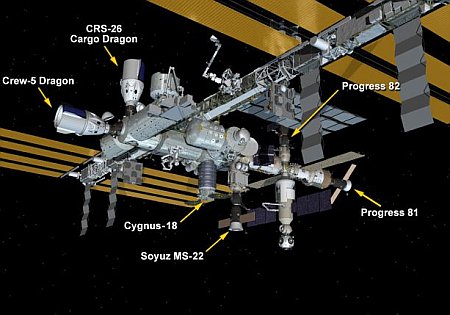Russians preparing replacement Soyuz for launch to ISS

ISS after November 28, 2022 docking of unmanned Dragon freighter.
MS-22 is the Soyuz capsule that is leaking.
Though a final decision will not be made until the completion on December 27, 2022 of their investigation into the leak in the coolant system of the Soyuz capsule docked to ISS, the Russians have begun preparing a replacement Soyuz for launch.
A backup spacecraft to bring cosmonauts aboard the International Space Station (ISS) back to Earth will be prepared by February 19 and the spaceship is currently undergoing tests at the Baikonur spaceport, Roscosmos Chief Yury Borisov said on Monday.
That replacement Soyuz was supposed to launch in March, which means they can only accelerate its preparation by about a month. Assuming it is determined that the leaking capsule cannot be used safely as a lifeboat, this means that until February the station does not have its standard complement of lifeboats.
Should something happen that requires an immediate evacuation before February, it might be possible to get an extra three people into the two Dragon capsules presently docked to ISS, since each was designed to carry a maximum of six passengers, though generally four is considered their maximum capacity.

ISS after November 28, 2022 docking of unmanned Dragon freighter.
MS-22 is the Soyuz capsule that is leaking.
Though a final decision will not be made until the completion on December 27, 2022 of their investigation into the leak in the coolant system of the Soyuz capsule docked to ISS, the Russians have begun preparing a replacement Soyuz for launch.
A backup spacecraft to bring cosmonauts aboard the International Space Station (ISS) back to Earth will be prepared by February 19 and the spaceship is currently undergoing tests at the Baikonur spaceport, Roscosmos Chief Yury Borisov said on Monday.
That replacement Soyuz was supposed to launch in March, which means they can only accelerate its preparation by about a month. Assuming it is determined that the leaking capsule cannot be used safely as a lifeboat, this means that until February the station does not have its standard complement of lifeboats.
Should something happen that requires an immediate evacuation before February, it might be possible to get an extra three people into the two Dragon capsules presently docked to ISS, since each was designed to carry a maximum of six passengers, though generally four is considered their maximum capacity.
